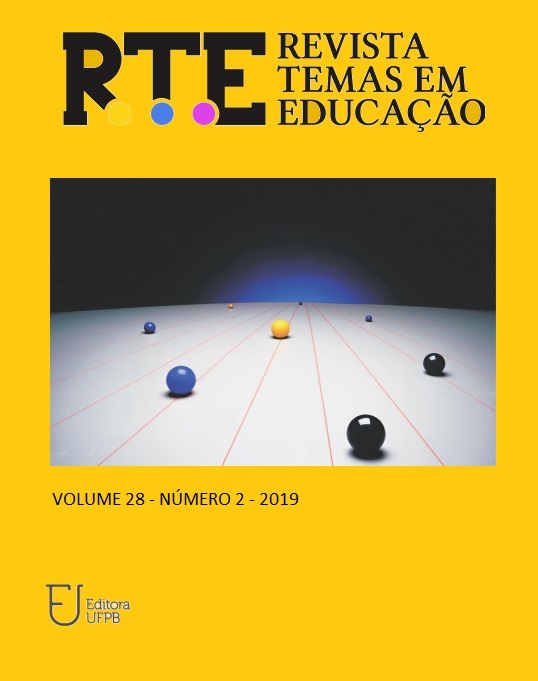INDIGENOUS SCHOOLS IN CEARÁ STATE: A STORY OF RESISTANCE
INDIGENOUS SCHOOLS IN CEARÁ STATE: A STORY OF RESISTANCE
DOI:
https://doi.org/10.22478/ufpb.2359-7003.2019v28n2.46123Keywords:
Original peoples, Identity, Interculturality, Indigenous School Education, Public PoliciesAbstract
The present work has as objective to investigate the routes traced by the native peoples to the emergence of indigenous school education in the State of Ceará, the origins of the differentiated and intercultural school, as well as research on policies and actions developed in this school environment aimed at respecting the identity and the self-recognition of this population. The State of Ceará currently has 38 indigenous schools of the state and municipal network, distributed in 16municipalities for 14 ethnic groups from Ceará. When thinking about the indigenous movement, especially about the emergence of indigenous school education in Ceará and its schools, there were some concerns and questions: what were the paths drawn in this struggle for resistance to the existence of a school designed by the original peoples and for these , guaranteeing their rights to this differentiated and intercultural school, aiming at preserving their identity and at the same time giving access to science and technology, withinthe standards of the schools assured by the Ministry of Education and its secretariats? How are policies and actions developed for these schools and their actors? As a theoretical reference, we list as main thinkers on the indigenous question: Martins (2015), Aires (2009), Nascimento (2006), and others, besides sources from the website of the Education Department and its responsible cell. The methodology adopted was ethnographic research, in addition to bibliographic research, through books, articles, documents and websites. An interview was held with the indigenous leadership (cacique) of Tremembé village. The results reveal a history traced by struggle, resistance, losses, negotiations, but also victories over the aspects related to the valorization of indigenous identity and self-recognition. The considerations reflect on the emergence of continuity over the struggle of the indigenous social movement and indigenous school education, on which more visibility and investment should be provided.
Downloads
References
AIRES, Max Maranhão Piorky et all. Escolas Indígenas e Políticas Interculturais no Nordeste Brasileiro. Fortaleza: EdUECE, 2009.
BRASIL. Constituição da República Federativa do Brasil. 1988.
______. Ministério da Educação. Referencial Nacional para Educação Escolar Indígena (RCNEI). Brasília, 1988.
______. Plano Nacional de Educação:lei nº 10.173, de 2001.
______. Diretrizes e Bases para a política nacional de educação escolar indígena. Brasília: MEC, 1993.
BOGDAN, R. e BIKLEN, S.K. Investigação qualitativa em educação: uma introdução à teoria e aos métodos. Porto: Porto Editora, 1994.
CARMO. H. FERREIRA, M. Metodologia da Investigação: guia para autoaprendizagem. Lisboa: Universidade Aberta, 2008.
DUQUE, João Manuel y DUQUE, Olga Fernandes. Educar para a diferença: Alcalá. Braga, 2005.
GOVERNO DO ESTADO DO CEARÁ. Secretaria de Educação do Estado do Ceará. Educação Escolar Indígena. Disponível em: < http://www.seduc.ce.gov.br/index.php/desenvolvimento-da-escola/207-desenvolvimento-da-escola/diversidade-e-inclusao-educacional/educacao-escolar-indigena/11297-educacao-escolar-indigena > Acesso em: 03 de novembro de 2017.
NASCIMENTO, R.G. Educação escolar dos índios: consensos e dissensos no projeto de formação docente Tapeba, Pitaguary e Jenipapo-Kanindé. 140f. Dissertação (Mestrado em Educação) – Departamento de Educação, Universidade Federal do Rio Grande do Norte, Natal, 2006.
MARTINS, Daniel Valério. Comunidade Indígena Jenipapo-Kanindé: O Processo de aculturação através da Educação Multicultural e diferenciada utilizada como ferramenta para o desenvolvimento. Tese do curso de Máster Interuniversitario en Antropología de Iberoamérica do Departamento de Psicología y Antropología Social da Facultad de Ciencias Sociales. Salamanca, 2012.
VENANCIO, João. Entrevista (ago. 2018). Entrevistadora: Sousa, M.V.L. Aldeia Tremembé, Itarema, Ceará, 2018. Entrevista através de questionário com questões subjetivas, concedida para a produção do artigo para a Revista Temas em Educação; janeiro, 2019.
Downloads
Additional Files
- Artigo “As escolas indígenas no Estado do Ceará: uma história de resistência” (Português (Brasil))
- Declaração de Autoria (Português (Brasil))
- Declaração de Revisão (Português (Brasil))
- Artigo “As escolas indígenas no Estado do Ceará: uma história de resistência” (Português (Brasil))
- Artigo “As escolas indígenas no Estado do Ceará: uma história de resistência” (Português (Brasil))
Published
How to Cite
Issue
Section
License
Authors who publish in this journal agree to the following terms:
. Authors retain the copyright and grant the journal the right to first publication, with the work simultaneously licensed under the Licença Creative Commons Attribution that allows the sharing of the work with acknowledgment of authorship and initial publication in this magazine. . Authors are authorized to assume additional contracts separately, for non-exclusive distribution of the version of the work published in this journal (eg, publishing in institutional repository or as a book chapter), with acknowledgment of authorship and initial publication in this journal.
. Authors are permitted and encouraged to publish and distribute their work online (eg in institutional repositories or on their personal page) at any point before or during the editorial process, as this can generate productive changes, as well as increase impact and citation of the published work (See O Efeito do Acesso Livre).



















